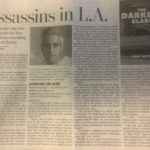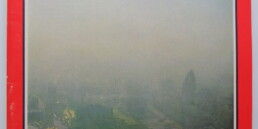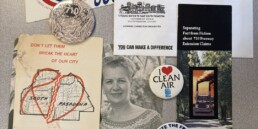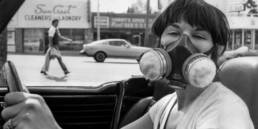It was the faces that slayed you that year, when the only reason for a belly-laugh was a Robin Williams standup act.
To this day, the expressions remain amber in memory: the knotted foreheads of Pennsylvanians near the meltdown at the Three-Mile Island nuclear-power plant; Jimmy Carter’s clenched grin realizing circumstance would relegate him to a one-termer. How a January that began hopefully with Terry Bradshaw’s aw-shucks glee after winning a Super Bowl in Miami metastasized in November into rage and disbelief at the righteous scowl of Iran’s Ayatollah Khomeini, who proclaimed “Death to America” as his followers took U.S. embassy workers hostage in Tehran.
For me, an ever-curious seventeen-year-old in the foothills of Pasadena, California, those flickering images, as well as other dismaying ones — the victims of crisscrossing serial killers, dying steel towns, Soviet tanks rolling into Afghanistan — seeded doubts about pretty much everything concerning the future. It was a kind of “Deer Hunter” state of mind.
So, blessed be for those unleashed Les Pauls, for thumping bass riffs, for singers going where the suited adults wouldn’t. The chrome housing of my pride-and-joy Sony stereo rarely grew cold, not as I gorged on a feast of eclectic, envelope-stretching music that painted my world the vivid colors seemingly bled out of the real one. Classic albums, melodic punk, dangerous New Wave: if you needed pretext for an album party, there was always cellophane to unwrap.
Blue-blood acts I adored — Led Zeppelin, Pink Floyd — were proving they weren’t longhaired dinosaurs ducking comets named Deborah Harry, Joe Strummer, Robin Zander or David Byrne. And just as Blue Oyster Cult sang about how nature continually revealed the foolishness of man, 1979 also sped the destruction of the glittery dance ball born from Barry Gibb falsettos, at least as evinced by the anarchy of the “Anti-Disco” night at Chicago’s Comiskey Stadium after a White Sox game.
Why am I effusing about music created when Beyonce wasn’t even born, churned out by musicians with the faint ring of a dive-bar Throwback Thursday trivia contest?
 In March of that year, on a rainy evening several freeways away from my bedroom poster of Jimmy Page in his white, dragon pants, a trio of wannabe assassins crouched on the deck of a suburban house in the San Fernando Valley, “America’s Suburb:” The killing in their sights would serve multiple purposes: as trance-inducing revenge for its mastermind, and as the inauguration of his murder-for-profit ring targeting real estate executives who squirreled hefty sums of cash at home.
In March of that year, on a rainy evening several freeways away from my bedroom poster of Jimmy Page in his white, dragon pants, a trio of wannabe assassins crouched on the deck of a suburban house in the San Fernando Valley, “America’s Suburb:” The killing in their sights would serve multiple purposes: as trance-inducing revenge for its mastermind, and as the inauguration of his murder-for-profit ring targeting real estate executives who squirreled hefty sums of cash at home.
Though I wouldn’t piece together this entire, bizarre story until 40-plusyears later, well after I junked my corduroys and mix-tape cassettes, it got me wondering. How would the saga of an only-in-LA business partnership — devolving as it did into treachery, gore, and criminal absurdity — sound if it was told by radio-blared songs rather than the pages of the true-crime book I wrote?
My parameter: do it with through ten works released in ’79, narrowing them to either top-sellers listed by Billboard magazine or ones praised by Rolling Stone and others. My reasoning: music is a sonic reverberation on its times, often depicting the era’s gestalt better us later moored to a keyboard.
***
Once upon a time, there was a young space planner (a.k.a. interior architect) who was brilliant and nerdy. He also wrestled with the labels the city slapped on him, sometimes unsure which way was up. Supertramp’s “The Logical Song” must’ve been his jam.
To compensate for his inexperience, the space planner hired a suave, older associate to be the public face of their upstart firm, Space Matters. This man, from a wealthy West L.A. family that’d yoked high expectations on him, was equally ambitious but also more risk-taking. He sweet-talked his partner into adding hard-hat construction services to their otherwise white-collar enterprise.
“Stagflation” economy” and all, Space Matters killed it at first, landing deals from grand dame Wilshire Boulevard to the futuristic westside. Anyone been to Tom Petty’s “Century City?” They sold to insurance companies and stuffy banks, pop-psychology groups advocating nudity, weed, and primal screaming, as well as a sixties’ counterculture figure turned leasing tycoon. For strange bedfellow colleagues working out of an old mansion near L.A.’s posh “Miracle Mile,” they rolled like they were, in Police vernacular, “Walking on the Moon.”
Voyages, however, are propelled by trust and expertise, not deception camouflaged by toothy smiles. The very partner the young space planner recruited had actually cheated him out of tens of thousands of dollars, jeopardizing everything they’d built. At an ambush meeting at the glitzy Polo Lounge, the blow-dried embezzler was booted out of the promising firm. Let Joe Jackson explain how flimflams are devised. “I’m The Man.”
If this were the old Dick Clark game show, “The $20,000 Pyramid,” the grand-prize question would be why such a talented, charismatic person needed to resort to such knife-in-the-back trickery? The regrettable answer: uncontainable demons, self-shame, and, beneath the surface, paranoia that his wife, a spunky, ravishing woman much his junior, needed to be indulged, lest he lose her. She was, more or less, his “My Sharona,” as presented by The Knack.
The problem with cheaters is that they often cheat multiple suckers, with some less willing than others to answer with a lawsuit or eternal disgust. A monster, who hide behind the legitimacy of his nine-to-five, Joe Sixpack persona, put a contract out on the trickster as proof. When the first assassin he hired to take care of the matter developed cold feet and fled up north, he found himself on the execution list, becoming a “Renegade,” albeit not how Styx imagined.
Even with blinking lights he was being hunted, the older space planner — a man with two daughters, an estranged spouse still open to reconciliation, and many others who loved him — remained in LA when he should’ve booked a flight on the Concord to a remote European village. To squish down his inner torment, he hooked up that stormy night with a former secretary and rolled himself a doobie, felling “Comfortably Numb.” He just could’ve used a wall more fortified than Pink Floyd’s.
The mastermind pounced on his target’s lethargy, driving his El Camino across at least four freeways with his bottom-scraping, gaffe-prone toadies. The intent was bloodier than AC/DC’s “Highway to Hell.” Job done, dozens of Angelenos connected to a bullet-pierced window were petrified of opening their curtain — or seeing that shark-like Chevy round their block. They knew, like Elvis Costello knew, that “Accidents Will Happen.” They just didn’t understand who picked the victims.
toadies. The intent was bloodier than AC/DC’s “Highway to Hell.” Job done, dozens of Angelenos connected to a bullet-pierced window were petrified of opening their curtain — or seeing that shark-like Chevy round their block. They knew, like Elvis Costello knew, that “Accidents Will Happen.” They just didn’t understand who picked the victims.
Nobody had more reasons to keep looking over his shoulder than our nerdy space planner. For months, he “lived” in disguise, under occasional protection of an-ex Israeli mercenary, surviving a botched showdown at the creepy La Brea Tar Pits. It’d take him decades before he could live as blithely as the good timer in Squeeze’s “Cool for Cats.”
And only then with a raging mistrust of the true L.A. behind its sunny mask.
To hear the Spotify playlist from this essay, click here! This essay was first published on Medium here.
Related Posts
The Brown Air Prequel for our Climate Change World
Why the Sky Disappeared, and Why L.A.'s Smog-Choked…




